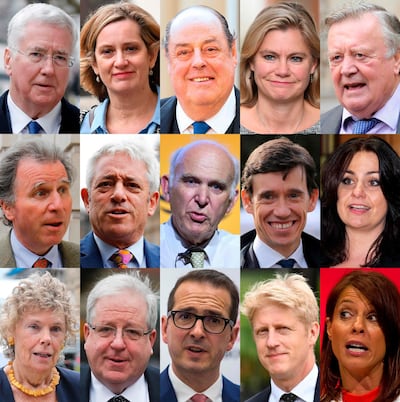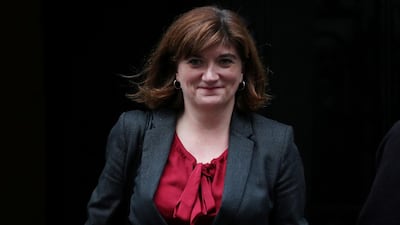Several high-profile female MPs from the ruling Conservative Party have announced they will not stand again in the upcoming UK general election, prompting concern that abuse is forcing women out of the party.
Nicky Morgan and Amber Rudd are among nine MPs, who were elected as Conservatives in 2017, but will not be seeking re-election two years later.
Four other female Conservative MPs have left the party in the past 10 months over Brexit, bringing the total number of female MPs departing since the last election to 13. This means the Conservatives have are set to lose 19.4 per cent -nearly a fifth of its female MPs – since 2017.
While more than double the number of Conservative male MPs have either been suspended, defected or announced they will not seek re-election, the proportion of male departures from the party is much lower as 79 per cent of the 316 Conservative MPs elected in 2017 are male.
The female departures have led to calls for more to be done to protect MPs from abuse they receive as the Brexit debate becomes more polarised.
Ms Morgan, who is currently the culture minister and supported remain in the 2016 EU referendum, said on Thursday the abuse MPs received had “contributed” to her decision to quit but was not the “tipping point”.
"I think the role of being an MP has changed," she told the BBC. "I think the abuse, because of the platforms, because of how strongly people feel about the current political situation, that has changed enormously in the almost 10 years since I started."

Former Conservative MP turned Liberal Democrat Heidi Allen said she was stepping down because of the “utterly dehumanising” abuse she had received.
First elected in 2015, Ms Allen quit the Conservatives earlier this year in protest the party’s pro-Brexit stance.
In August, a man was jailed for sending Ms Allen abusive posts on Twitter and Facebook.
Aged 47 and 44 respectively, Ms Morgan and Ms Allen are a long way away from retirement age.
When former work and pensions minister Ms Rudd said she was stepping down she was caught up in an online row with the Chief Whip Mark Spencer. The Chief Whip ensures members of the party attend and vote in the way the party leadership supports.
Ms Rudd, who quit her cabinet position over Prime Minister Boris Johnson’s Brexit approach and was thus suspended from the Conservatives, was told publicly she would not be admitted back into the party.
Antoinette Sandbach, the former Conservative MP who will be standing as an independent in the upcoming election, said the female departures represented an “exodus of talent” from the party.
Ms Sandbach, who was ejected from the Conservatives after voting against the government last month, has previously said she carries a personal alarm, having received death and rape threats online.
Sarah Wollaston, an ex-Conservative MP who defected to the Liberal Democrats over Brexit, criticised her former party’s Chairman James Cleverly when he retweeted a post appearing to downplay the abuse that female MPs receive.
“If you look at the nine Conservative women who are standing down who are part of the 2017 women elected to the Conservative party, five of them are aged 50 or under,” Dr Wollaston told the BBC on Thursday.
“But two of the 20 men are 50 or under so there’s a difference in terms of the age breakdown and the proportion, so I think James [Cleverly] should be taking this far more seriously. You look at 67 women and 249 men elected as Conservative MPs in 2017 and he should be looking very carefully at why women are stepping down at a younger age and having served for far shorter time in Parliament.”
Mr Cleverly has since tweeted that while MPs “need to be resilient” it was “heartbreaking” to hear that women were leaving politics because of online and physical abuse.
The exodus of female MPs has not been limited to the Conservatives. Louise Ellman, a Jewish MP, quit the main opposition party Labour earlier this month, will not be seeking re-election. She criticised the party’s leader Jeremy Corbyn for his approach on tackling anti-Semitism within Labour.
Labour Brexiter Gloria de Piero’s decision not to stand again was reportedly due to “intolerance” within the party.
In 2016 remain-supporting Labour MP Jo Cox was murdered by a far-right extremist just days before the Brexit vote.
Seema Kennedy is one of the nine female Conservatives who announced their departure from politics, having served less than five years as an MP.
Ms Kennedy was working with Ms Cox on a commission to tackle loneliness before the MP for Batley and Spen was murdered. In her resignation letter, Ms Kennedy said the commission, which she completed in memory of Ms Cox after her murder, was “the work of which I am most proud”.


